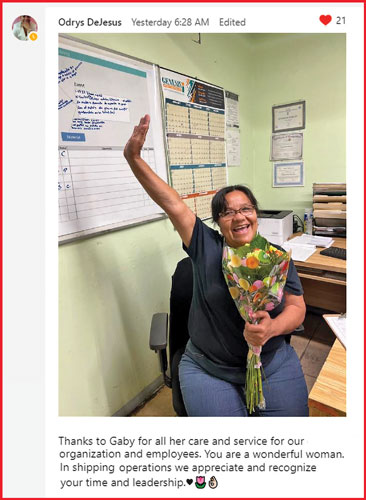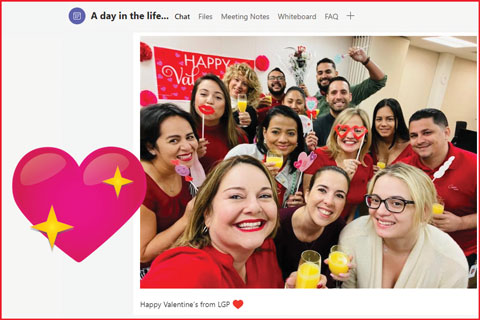4/1/2022
A True Voice
Jennifer Zurko

Titles changed to reflect the focus on the people who work for the company. Small meetings are more frequent. Constant communication and feedback are part of daily life. The relationship between supervisor and employee is no longer so one-sided.
Pictured: Every October, Costa Farms holds a breast cancer awareness drive when team members are encouraged to wear pink and donate $1 to raise money and be entered into a raffle.
Costa Farms’ focus on employee safety opened the door to implement a complete communication and team member development strategy, called the Costa Production System (CPS), that helped shape its current company culture.
Arianna Cabrera de Ona is Costa Farms’ Chief People Officer. It’s a fun way to refer to the head of Human Resources and reflects the company’s primary focus on its employees (they call them team members). She’d been Costa Farms’ general counsel for 14 years until two years ago when her predecessor recommended her to head the human resources department, as well. She picked up where he left off, working to create a company culture that puts team members first.
“It’s a focus for us as a team, but also a reminder for everybody else that we work with that our primary focus is our people. Period. It’s as simple as that,” said Arianna. “We didn’t do a lot of research about it—it wasn’t like we delved into research reports on the best, most positive name for a human resources team, or that we went to a consultant and said, ‘We want to re-brand our human resources team.’ We literally said that this is a reinforcement to us as a team and to every person working with us that our primary focus is our people.”
And for the last five years, Costa Farms has been continuously developing a company culture that puts team members at the center of the hub where all communication filters in and out.
 Pictured: Costa Fa
Pictured: Costa Fa rms has an internal Instagram-type of site that they call “A Day in the Life” where team members can post photos of their kids/pets/family and celebrate holidays or special milestones.
rms has an internal Instagram-type of site that they call “A Day in the Life” where team members can post photos of their kids/pets/family and celebrate holidays or special milestones.
The power of the huddle
The problem: How do you communicate safety procedures and company information to team members out in the field who don’t have access to email, while also providing an environment for them to give feedback?
The solution: Quick, five-minute “huddles” that happen every morning before team members start their day.
Every farm holds five-minute huddles daily that focus on three different things: safety, quality and productivity.
“When we’re talking about safety it gives every person on the team an opportunity to raise any kind of concern that they have about the condition of equipment or even a pothole in the ground,” explained Arianna. “Basically, everybody is in charge of safety for us. Obviously, we have a team for safety, but we’re giving our people a voice to be able to raise concerns. For us, this was transformational because I think it was the first time that our people felt like they had a true voice in the company.”
Arianna said she didn’t realize how useful—and powerful—the huddles were until October 2019, when Costa Farms held a breast cancer awareness drive. All team members were encouraged to wear pink and donate $1 to raise money and be entered into a raffle. The information went out on a Friday and the next Monday, while she was walking around Costa Farms’ North Carolina location, she could hear supervisors talking about the awareness drive in the huddles. Two days later, when the event took place, she was getting tons of pictures of team members out in the field wearing their pink.
“We have close to 250 huddles a day [company-wide], so this takes a lot of networking out to the farms. And they were hearing about it the next business day, first thing in the morning, so I thought that was pretty amazing,” she said. “Even when you look at the amount of money that we raised, what was so impactful to me was how well the communication worked. Using that, it allows us to do a lot more with this large labor force that doesn’t have access to the traditional means of communication.”
Communicating through COVID
Arianna credits their company culture as the reason why Costa Farms was able to better communicate safety and information to their team members during the pandemic. If they didn’t already have their chain of communication well-established, especially during a chaotic crisis like COVID, there would have been a lot of confusion and frustration.
“When the Miami-Dade County came to us and asked if they could do testing for free for all of our workers, we were able to get feedback within a day of how many people wanted to be tested,” said Arianna. “The same with vaccines—we were the first farm to offer vaccines to all of our employees at all of our farms. It was very simple to get feedback back to the county. These [vaccines] have to be refrigerated, so they needed to know numbers and we could gauge interest very quickly, allowing us to turn around and provide services to our teams very quickly.”
And the speed with which Costa Farms communicates to its employees didn’t go unnoticed. The CDC actually visited Costa in June of 2020 to learn about the processes they had in place so that they could pass those best practices on to other companies.
“Maybe for other farms it’s not that big a deal, but when you have 5,000 employees, having something like this is a big deal for us,” Arianna said. “It’s what allows us to get as big as we’ve gotten and still maintain the close feel of a family run company.”
Leading by putting others first
A newer concept that Costa Farms has been working on is “servant leadership.” This is essentially where managers put the needs of their employees first. Arianna said it’s allowed them to completely transform their leadership model.
“I think that our traditional farm model, and I don’t think that we were unique, 10 years ago was more of a patriarchal model—the manager knows what’s best for his or her employees,” she said. “Now everybody feels like they have a voice. We train all of our managers in servant leadership, which means you need to put the needs of each of your team members before your own. As a leader, you shine when your people shine. The development of every person on your team is of the utmost importance.”
At the same time that the company implemented CPS and the servant leadership model, Costa Farms’ executive committee developed a strategic plan with specific goals and values that expressed the company’s “vision” for the future, including what they call “H3” (see sidebar). Arianna said that most of the managers at Costa Farms really embraced the strategy management concept because having clear direction and goals has made it easier for them to lead their teams.
“I think clarity around what we were doing, where we were going and who we wanted to be coalesced very nicely,” said Arianna.
Love where you work
It all boils down to leaving the lines of communication open between both the company and its team members. Besides the huddles and servant leadership program, Costa holds monthly company-wide “broadcasts” over Microsoft Teams to keep employees updated on sales numbers, major initiatives, COVID and other safety protocols, company events and to highlight “wins.” These started during the height of the pandemic when they were happening weekly, but they were so well-received they decided to continue them every month.
Arianna’s team sends out an e-newsletter and “HRTV” plays on monitors around the buildings that lists birthdays, anniversaries and new employees. They also have an internal Instagram-type of site that they call “A Day in the Life” where team members can post photos of their kids/pets/family, and celebrate holidays and personal milestones like weddings and graduations.
All of these avenues of communication make people feel connected, said Arianna, because Costa’s main goal is to always create a “love where you work” environment.
“When we talk about our company culture—allowing everybody to have a voice and allowing everybody to feel respected—(it) is very important.”
Costa Farms’ H3
At Costa Farms, Arianna said every team member is expected to exemplify three values that they refer to as H3: Humble, Hungry & Hustle. It’s a good top-down approach that builds a foundation for team members with levels of goals, values and characteristics that the company hopes they all strive toward. This then trickles down to the smaller five-minute huddles, keeping everyone on the same page.
In 2019, Arianna’s team worked to really define what each one means with goals/characteristics for each.
Humble: To personify servant leadership. “In order to be a good servant leader, you’re humble because it’s not just about yourself, it’s about the people around you,” explained Arianna.
You work collaboratively. You actively listen, then speak. You help others be great and celebrate their wins. You are authentic and instill trust. You value diversity.
Hungry: If you’re hungry, you passionately strive to be the best. You’re a visionary for our industry. “We value strategic thinking,” she said.
You actively create value. You seek learning opportunities. You create high-performing teams. You develop a deep understanding of our business. And you inspire others with a thirst for excellence.
Hustle: You’re nimble. You act with urgency and purpose. You deliver solutions. You exemplify perseverance. And you think innovatively.
“The common themes that run through the three of them and what we added last to our values statement is that all three are rooted in care, respect and safety,” said Arianna. “If you think of it as a plant, at the root of all of it is that we care, we respect and we value safety for each and every one of our team members.” GT